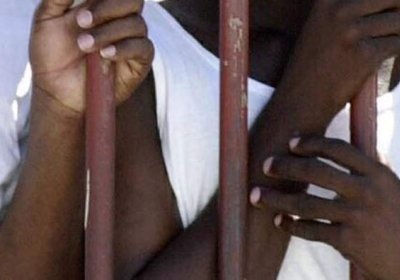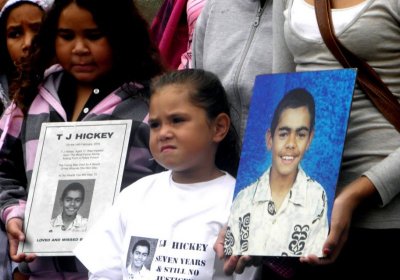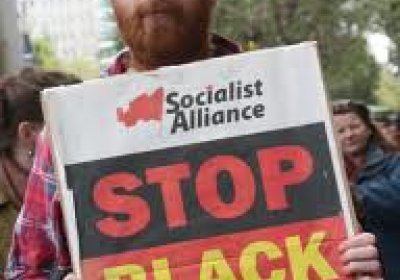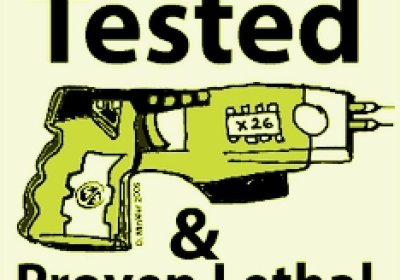Hundreds of Australians endure the ordeal of jail because of unpaid fines. Their poverty is a burden. Disproportionately, Aboriginal and Torres Strait Islander people are incarcerated “to pay off” their fines.
Ray Jackson, president of the Indigenous Social Justice Association, says this “draconian practice criminalises people and destroys families and futures”.
Recently, “unpaid fines” cost the life of a 22-year-old Yamatji woman, Juliecka Dhu. Dhu and her boyfriend, Dion Ruffin, were arrested on August 2 and detained by Western Australia’s South Hedland police.
Aboriginal deaths in custody
On February 14, 2004, as a consequence of a police pursuit, a Redfern police car driven by Constable Michael Hollingsworth rammed TJ Hickey’s bicycle. As a result, he was impaled on a spiked metal fence. The police did not follow proper medical practice and he died in hospital the next day.
This year will be the 10-year anniversary of his death. The Hickey family, with the support of the Indigenous Social Justice Association, will be rallying at the fence line on the corner of George and Phillip streets in Waterloo to mark the occasion.
The Indigenous Social Justice Association (ISJA) released this open letter on November 22
***
Next year, on February 14, will be the 10th anniversary of the killing of the young Aboriginal man, TJ Hickey, as a consequence of the pursuit by the then Redfern police.
For nine long years, the Hickey family has been campaigning for justice and for the proper legal punishment of those directly responsible for TJ’s death.
Victoria police have apologised to the family of a man who died hours after being released from police custody in 2010.
The Age reported on November 20: "Deputy Commissioner Tim Cartwright, who is responsible for all people in police custody across the state, said officers at Dandenong police station had fallen well short of community expectations on how they treated Gong Ling Tang on May 12, 2010.
"Thirty Years But Still No Justice!" was the theme of an Aboriginal deaths in custody forum held in Redfern on July 27. Speakers addressed issues of deaths in custody, victims of police brutality and other social justice concerns.
The forum was also the Sydney launch of the National Deaths in Custody Coalition (NDCC), established in February this year to organise for a national day of action on Saturday, September 28 to mark 30 years since the death at police hands of WA Aboriginal youth John Pat in 1983. The meeting was sponsored by the Indigenous Social Justice Association.
Shock facts on Aboriginal people and Australian prisons:
* The proportion of Indigenous prisoners has almost doubled in the 20 years since the Royal Commission.
* In 2011, Aboriginal people made up 2.5% of the Australian population. They accounted for 46.2% of all youth in juvenile custody and 26.1% of total adult prison population.
* In the NT, Aboriginal people made up 30.3% of the total population, 96.9% of the juvenile detention population and 82.3 % of the adult prison population.
Social justice and anti-deaths in custody organisations around Australia formed a new national coalition on February 10.
The new group will allow for national actions to be organised when a death in custody occurs that requires a national response and coordinated action.
The organisations involved include the Indigenous Social Justice Association and the Deaths in Custody Watch committee.
Groups in other states and territories have expressed interest in joining the coalition.
For nine long years Gail Hickey and her family have indefatigably campaigned for justice over the death of their son, TJ Hickey, an Aboriginal man who was 17 years old. He died as a consequence of a pursuit by Redfern police that ended with his death the following day.
For nine long years Gail, the family and their supporters have been telling and re-telling the history. His bike was rammed by a police car, he was thrown in the air with great force, and landed on a spiked fence line with great force.
Aboriginal rights protesters gathered outside the Northern Territory tourism bureau in Sydney on March 21 to protest the death in custody of 28-year-old Aboriginal man Terrence Briscoe, and to condemn the “Stronger Futures” bill that will extend the NT intervention.
Deaths in custody campaigner Ray Jackson told the rally: “When Terrence died in a police cell, the family were first told it was a heart attack. Then it was respiratory. Then it was asphyxiation. How do you asphyxiate? When police jump all over you, forcing your breath out.
Mulrunji Doomadgee died in police custody on Palm Island in November 2004. Despite reviewing findings highly critical of police by coroner Brian Hine at the third Coronial Inquest in May, on November 23 the Queensland Criminal Justice Commission (CMC) found there was insufficient evidence to prosecute the officers involved.
Community activists in the Illawarra have again condemned the use of Taser guns and renewed calls for a ban on the controversial weapon. This calls comes just days after a man in Sydney's west died after being struck by a Taser in the chest by police. A video from 2008 has also emerged of an Aboriginal man with a mental illness being Tasered 13 times by police officers in West Australia.
Twenty people attended a September 28 Indigenous Social Justice Association (ISJA) meeting to hear Bruce Campbell, from the WA Deaths in Custody Watch Committe, discuss the campaign for justice for Mr Ward.
On Invasion Day (January 26) 2008, Mr Ward, a respected Aboriginal elder, was arrested and died of heat stroke in the back of a prison van the next day while being taken 360km in 42°C heat.
- Previous page
- Page 11
- Next page










